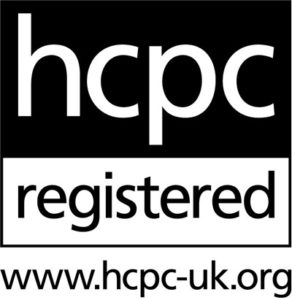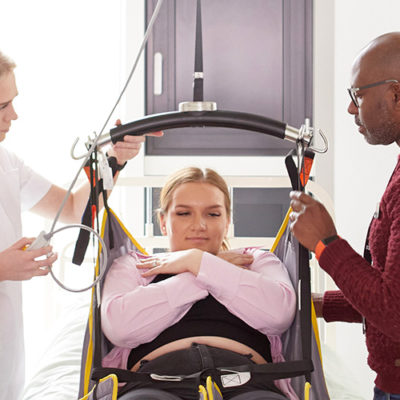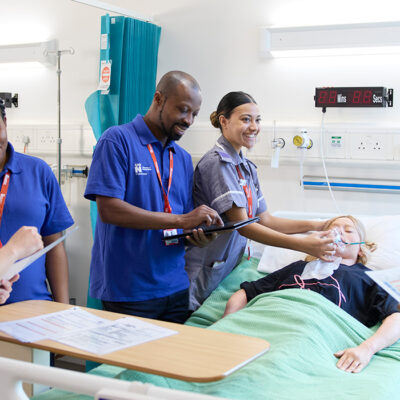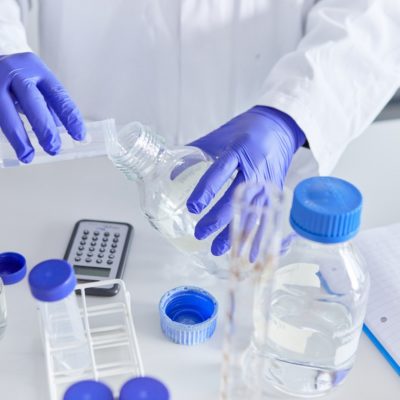
Paul Fletcher
Senior Lecturer in Podiatry
Faculty of Health, Education and Society
DiscoverUCAS Code
B985
Level
Undergraduate
Duration
3 years full-time
Starting
September
BBC at A Level
DDD at BTEC
Fees UK 24/25
Full Time: £9,250
Fees International 24/25
Full Time: £16,200
Location
For questions regarding study and admissions please contact us:
The University of Northampton’s BSc Podiatry degree aims to produce graduates who are fit for practice within the NHS or private sectors within the UK and overseas. You will benefit from clinical placement and education at our Podiatry Clinic adjacent to Northampton General Hospital. The clinic is equipped with the latest technology. For further information about the course, including a virtual tour of our Podiatry Clinic, please visit our Podiatry page.
On successful completion of the BSc podiatry course you will be eligible to apply for registration with the Health and Care Professions Council (HCPC). The course is accredited by the College of Podiatry.


Updated 15/04/2024
Upon completion of the BSc Podiatry course you will be equipped to establish and run your own clinical practice and will have a wide variety of work opportunities both in the UK and overseas.
Our Podiatry course comprises theory and clinical studies modules. At the end of stage one you will undertake a local placement which is preceded by pre-clinical studies. During the second stage you will undertake orthopaedic and physical medicine clinics in-house as well as completing local and national placements. During the final stage you will have the opportunity to practise at several specialist clinics which include at risk, sports and paediatrics. You will be trained to undertake selected procedures under local anaesthesia. At the final stage of the podiatry degree you may have the opportunity to attend to injuries at the London Marathon under the guidance of academic staff.
The Podiatry degree at the University of Northampton aims to develop your skills through clinical activity and rigorous academic content, this combination will help to transform you into the highest quality practitioner.
If you were once a registered allied health professional but took a career break and are looking for more information about financial, clinical and academic support available to return to practice visit the Health Education England site.
Placements
You will undertake a number of placements in a range of clinics and settings and will be trained to undertake selected procedures under local anesthesia.
You will benefit from clinical placement and education at our Podiatry Clinic allowing you to put your skills into practice and gain valuable experience. We run busy clinics which include sports, paediatrics, at risk, orthopaedic, physical medicine, general and nail surgery.
At the final stage of the course you may have the opportunity to attend to injuries at the London Marathon.
As part of your second year you may be able to take part in a three week placement within an EU or international healthcare setting.
Please note the modules shown here relate to the academic year 23/24. The modules relating to the academic year 24/25 will be available from June 2024.
All applicants for the Podiatry BSc course must have:
We welcome applications from students with a mix of A levels and BTEC/Cambridge Technical qualifications.
You will also need to have completed some work or volunteering experience within the Podiatry field. If you do not have this experience you may be asked to gain experience and, as evidence, provide a written reflective account which is to be signed by the facilitator.
All offers of a place on the podiatry course will be made to applicants after completion of successful interviews, and will be conditional subject to:
For more information on how to make an application for podiatry courses, please visit our How to Apply page.
If you are an International student and would like information on making an application, please see our How to Apply page.
All International and EU students applying for a course with us must meet the following minimum English language requirements:
For information regarding English language requirements at the University, please see our IELTS page.
Fees quoted relate to study in the Academic Year 24/25 only and may be subject to inflationary increases in future years.
Fees quoted for the podiatry degree relate to study in the Academic Year 23/24 only and may be subject to inflationary increases in future years.
Financial contribution towards your travel, and expenses in relation to your practice learning opportunities, may be available to you from the NHS Learning Support Fund. Details, including eligibility criteria, can be found on the NHS website.
For more information about possible funding options for podiatry courses, please visit our Fees and Funding pages.
At the University of Northampton, everything we do, from funded trips to paid internships, is to give you everything you need to make a difference when you leave.
If you join our full-time Podiatry degree at Northampton, you will receive a laptop when your course begins*. The laptops are built to a bespoke custom specification ideal for use in the seminar room, collaborative group work or studying at home.
Whatever your ambitions, we’re here to help you to achieve them. We’ll support you to identify the skills you’re learning during your podiatry course, find your strengths and secure practical experience so that when it comes to applying for jobs or further study you’ll feel confident in standing out from the crowd. We’ve created the Northampton Employment Promise because we are so confident that if you focus on your studies and complete one of our awards you’ll be highly employable by the time you graduate. Putting you in a great position to secure employment or continue your studies.
To check out the full list of perks, visit our Student Perks page or dedicated International Perks page.
* UK fee payers only (see Terms and Conditions for further details)
Assessment methods used on the BSc Podiatry include coursework and examinations.
You will benefit from clinical placement and education at our Podiatry Clinic allowing you to put your skills into practice and gain valuable experience.
We run busy clinics which include sports, paediatrics, at risk, orthopaedic, physical medicine, general and nail surgery.
Our Podiatry course aims to develop your skills through clinical activity and rigorous academic content, this combination will help to transform you into the highest quality practitioner.
Podiatry Senior Lecturer, Krishna Gohil, has received national recognition for her commitment to providing the best patient care and promoting her profession. "Podiatrists perform vitally important work, so I want to continue with the work that gained me this recognition to improve the visibility of podiatry, to get people talking about it."
Senior Lecturer in Podiatry
Faculty of Health, Education and Society
DiscoverSenior Lecturer in Podiatry
Faculty of Health, Education and Society
DiscoverSenior Lecturer in Podiatry
Faculty of Health, Education and Society
DiscoverSenior Lecturer in Podiatry
Faculty of Health, Education and Society
DiscoverSenior Lecturer in Podiatry
Faculty of Health, Education and Society
DiscoverAn insight into the diverse range of job opportunities from podiatry courses may be shown by where our graduates and staff team have worked in National Health Service, podiatric surgical consultancies, multidisciplinary diabetic clinics (NHS), orthopaedic triage (NHS), podiatric day case surgery teams, private practice UK/overseas, sports medicine practice, teaching and research, industry, mechanical therapy laboratories, treating diabetes in European communities, treating leprosy patients in India, HMS Prisons, paediatric podiatry and forensic podiatry.
Our Master’s courses are a great way to enhance the skills you have already learnt. Benefit from our 20% alumni discount on postgraduate fees to give you a CV that will catch the eye of employers.
Successful completion of this podiatry course could lead on to one of our postgraduate programmes: MSc Public Health, MSc Advancing Practice, Doctor of Professional Practice in Health and Social Care
At the University of Northampton, we offer a range of short courses and continuing professional development (CPD) programmes. These will enable you to learn new skills, progress into specialisms or take on new responsibilities.
"[The placement] exposed me to lots of different situations and pathologies, some more common and some less common, and how to manage them and when to refer on. You’re never done learning but there’s nothing like seeing real-life situations and treatments to put the evidence and theory into practice, which just can’t be simulated in the classroom." - Josephine Smith -
Bespoke clinic for hands-on practical experience with patients. A short walk from campus at Northampton General Hospital
DiscoverTeaching rooms, private consulting rooms, gait analysis room, and more.
DiscoverThe Learning Hub is at the heart of the campus and home to the student information desk.
Discover
The BSc (Hons) Occupational Therapy degree prepares you to work as a registered occupational therapist in the UK and overseas.

Our nursing course will give you the ability to cope with a demanding and satisfying profession leading to BSc Adult Nursing (Hons) and registration with the NMC.

Our Biomedical Science degree is designed to equip you with a fundamental understanding of how science underpins the prevention, diagnosis and treatment of disease.